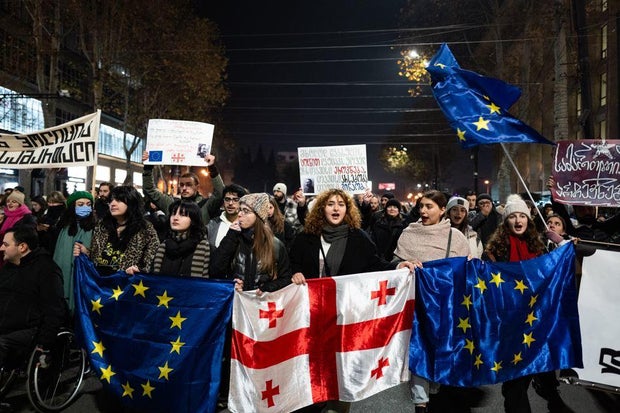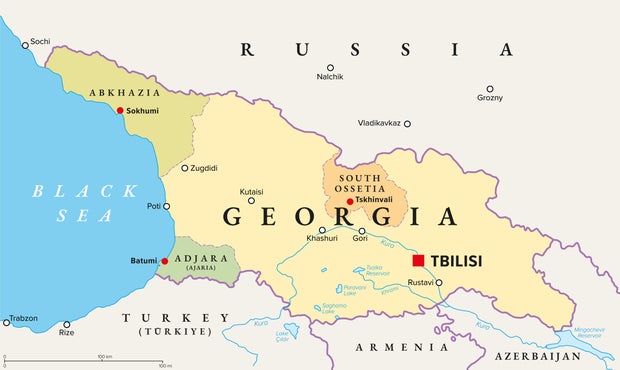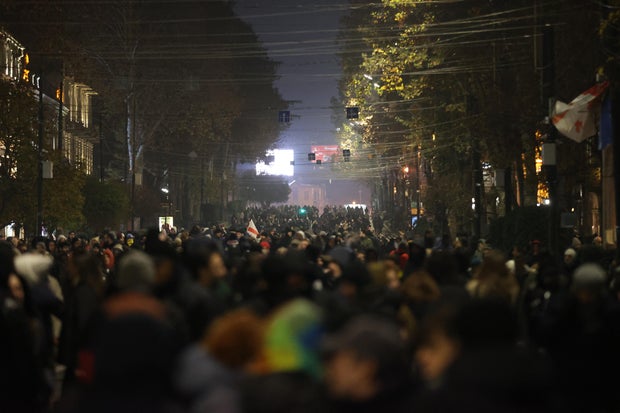Violent protests in Georgia highlight battle over the country’s future. Here’s why it matters.
Live television coverage showed police in the former Soviet republic of Georgia beating and arresting an opposition leader last week during a raid on his party’s offices. The scenes played out on the 10th day of violent clashes in capital city Tbilisi between police and protesters furious about the Georgian president’s decision to put talks on joining the European Union on hold.
The unrest that erupted two weeks ago, after months of public frustration over Georgia’s future, has caused significant casualties and seen more than 400 people arrested.
Over 100 people have been hospitalized with injuries sustained during clashes with riot police, but the protesters continue taking to the streets of Tbilisi by their thousands every night.
Jerome Gilles/NurPhoto/Getty
As the protests continue, there’s concern the political crisis could escalate into more widespread violence, and there’s also concern that a key U.S. partner on the far eastern edge of Europe could shift its political tendencies away from the democratic West and toward Moscow — whether or not its people agree with the move. Below is a look at what led to the unrest, and why the political crisis in the country that straddles Europe and Asia matters to the wider world.
What led to the protests in Georgia?
The protests have been driven largely by what many Georgians see as the governing Georgian Dream party’s increasing authoritarian tendencies. In power since 2012, the ruling party led by billionaire Bidzina Ivanishvili initially promised democratic reforms and closer ties with Europe and the West, including the EU.
Critics argue that over time, the party has shifted toward Russia, undermining many Georgians’ aspirations to see their country join the EU.
The government’s decision to freeze EU accession talks, and before that, to adopt a controversial “foreign agents” bill similar to legislation in Russia, were both seen as clear evidence of that shift to the east by Georgia’s ruling party. There were previous protests over the new law as it went through the approval process, with many fearing it will stifle civil society and media freedom in the country.
The situation deteriorated in November following allegations of voter suppression and election fraud in parliamentary elections. The post-election protests, which grew in size and intensity, were fueled by opposition claims that the government was manipulating the democratic process.
President Salome Zurabishvili, an independent politician, has been among the most vocal critics of the ruling Georgian Dream party over alleged election interference, calling the recent vote a “total fraud.” According to the Reuters news agency, two international polling groups from the U.S. agreed with that assessment, calling the results statistically impossible.
On Dec. 3, the country’s Constitutional Court rejected Zurabishvili’s call to annul the parliamentary election results, further exacerbating the tension on the streets. On the ninth day of the protests she called the actions of the police gross violations of human rights in her post on X.
Georgia’s relationship with Russia
The protests in Georgia have highlighted the country’s complex, fraught relationship with its much larger neighbor to the north, Russia.
Russia invaded Georgia in 2008 and it continues to occupy the regions of South Ossetia and Abkhazia.
iStock/Getty
Russia firmly opposes Georgia’s aspirations to join both the EU and the U.S.-led NATO military alliance, and it has leveraged both its economic and political influence to try to prevent the country from aligning with the Western institutions.
In an interview with 60 Minutes earlier this year President Zurabishvili called Russia’s subtle, yet impactful bid to influence Georgian politics part of a “hybrid war” being waged by Moscow against the West.
She said Russia’s tactics included spreading disinformation, exerting economic pressure and manipulating internal politics to prevent Georgia from fully integrating with its European neighbors to the west.
Critics, including the president, highlight the recent adoption of the foreign agents law, which requires all non-profit organizations and media outlets that receive foreign funding to register as “foreign agents” in Georgia, as an example of the ruling party dragging the country closer to Russia’s authoritarian model.
Similar laws in Russia, enacted since Vladimir Putin ordered the full-scale invasion of Ukraine in 2022, have been used to curb dissent and limit political freedom.
Critics argue that the law represents a major setback for democratic reforms set in motion when Georgia gained its independence from the former Soviet Union, and it was always seen as a significant hurdle to EU membership.
LGBTQ rights in Georgia have also been a contentious issue, with the ruling party and influential religious groups often opposing reforms. Discrimination against LGBTQ people remains widespread, and pride marches are regularly met with violent counterprotests.
The social divide is another point of tension, as many pro-European activists see the protection of minority rights as an essential part of Georgia’s future in the EU.
Why does Georgia’s political crisis matter to the U.S.?
Georgia’s political unrest has important implications for both the European Union and NATO, with Western capitals worried that a move toward Russia and its style of authoritarianism could embolden Moscow as it tries to curb Western influence across the continent.
Georgia has been a critical partner to the U.S. in the South Caucasus region, which straddles the border between Eastern Europe and Asia. If Georgia’s government continues shifting its alignment toward Russia, it could undermine U.S. influence.
“Political crisis in Georgia is a significant challenge for the West,” Royal United Services Institute associate fellow Natia Seskuria told CBS News. “Georgia has remained one of the most pro-Western countries in the region, with an overwhelming majority of the population supporting the country’s integration into the EU and NATO.”
Seskuria said the lack of any significant international response to the unrest was likely deepening and prolonging the crisis.
The U.S. State Department suspended its strategic partnership with Georgia at the end of November, citing the country’s shift away from European integration.
Davit Kachkachishvili/Anadolu/Getty
“The Georgian people overwhelmingly support integration with Europe,” the State Department said when it suspended the partnership, adding a condemnation of “the excessive use of force by police against Georgians seeking to exercise their rights to assembly and expression, including their freedom to peacefully protest. We call on all sides to ensure protests remain peaceful.”
Seskuria said all eyes in Georgia were on the incoming Trump administration, with many wondering how it might approach the country’s political tumult given Mr. Trump’s previous remarks praising President Vladimir Putin.
President Zurabishvili, speaking to 60 Minutes in June, expressed her frustration with what she deemed lackluster U.S. support for the peaceful protests against Russian-sympathetic political forces in her country.
“I think that some more public recognition is needed,” she said.




